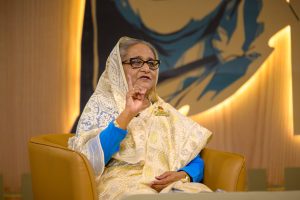There are fears that after the flawed election, the country will descend to totalitarian rule.

Credit: X/Awami League
In a few weeks, Bangladesh will vote in deeply flawed elections. The ruling Awami League (AL) seems set to tighten its authoritarian grip over power in a lopsided election that is being boycotted by the main opposition, the Bangladesh Nationalist Party (BNP). Ahead of the election, there is a palpable fear of the AL taking to totalitarian rule in the months ahead.
Italian polymath, Umberto Eco, who grew up during the time of fascist dictator Mussolini, wrote an essay when he was 10 years old on why Italians should die for Mussolini’s glory and Italy’s immortal destiny. His answer was in the affirmative and he won the first prize in the competition.
This story takes us to Carl Friedrich and Zbigniew Brzezinski, who argued that the key difference between autocracy and totalitarianism is that autocracy is defined by prohibitions, i.e., the understandings of what people must not do, whereas totalitarianism includes both prohibitions and imperatives or prescribed behavior i.e. the understandings of not just what they should not do, but also what they should do. So, in addition to the repression in authoritarian states, in totalitarian states, the mobilization of the masses to follow the state’s prescribed behaviors without question is crucial.
In Bangladesh, criticizing Prime Minister Sheikh Hasina, even on social media, is often criminalized. Her father, Sheikh Mujibur Rahman, Bangladesh’s founding father, is considered the “eternal sovereign” and immune to criticism. A new law that replaced the draconian Digital Security Act provides for a 5-year jail sentence and $90,000 in fines for anyone who criticizes Hasina’s father or the regime’s version of the “spirit of the Liberation War.”
But beyond the repressive measures, there is an ongoing effort to mobilize a new society of submissive masses. Like the 10-year-old Umberto Eco, children of Bangladesh are obliged to participate in competitions — essays, drawings, recitations — on the life and contributions of Sheikh Mujibur Rahman each year, and the winners receive books about him as prizes.
It is mandatory for every school and college to organize these competitions and senior education officials must ensure that they happen. One such official order from the education ministry reads (Section 2.4): “The relevant authorities of the educational institutions will monitor whether the educational institutions are adopting the activities-programs and observing them accordingly.” Besides, in 2022, the government issued a gazette declaring “Joy Bangla” (Victory to Bangla), the ruling party’s political slogan, as the national slogan that students have to chant after the daily assemblies at educational institutions.
So is the AL a totalitarian party, and if yes, what is its role? Political scientist C. W. Cassinelli’s analysis of totalitarian parties provides answers to both questions.
Cassinelli has argued that while a totalitarian regime’s primary goal is the maximization of power over as many aspects of the lives of as many people as possible, it does not necessarily need a party to do so as agencies of state can serve the purpose. Instead, the role of parties in totalitarian states is to create a facade for totalitarian leaders, who cannot be held accountable by any organization, obscuring the real structure of power and the mechanisms of the state agencies.
Bangladesh’s Home Minister Asaduzzaman Khan Kamal later justified the late-night action of police against the journalist within two hours of the filing of case claiming that police only followed legal procedures since a case was filed against the journalist. Subsequently, Prime Minister Hasina declared Prothom Alo the “enemy of the people” for reporting the high food inflation in the country.
And thus, while the state does what needs to be done, the party creates a facade for the regime.
It is widely accepted that Bangladesh is an “electoral autocracy” and has plunged into authoritarianism. The global civic space watchdog Civicus has downgraded the country’s rating to “closed.”
